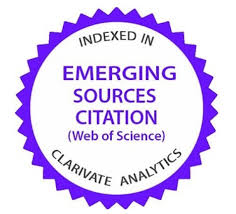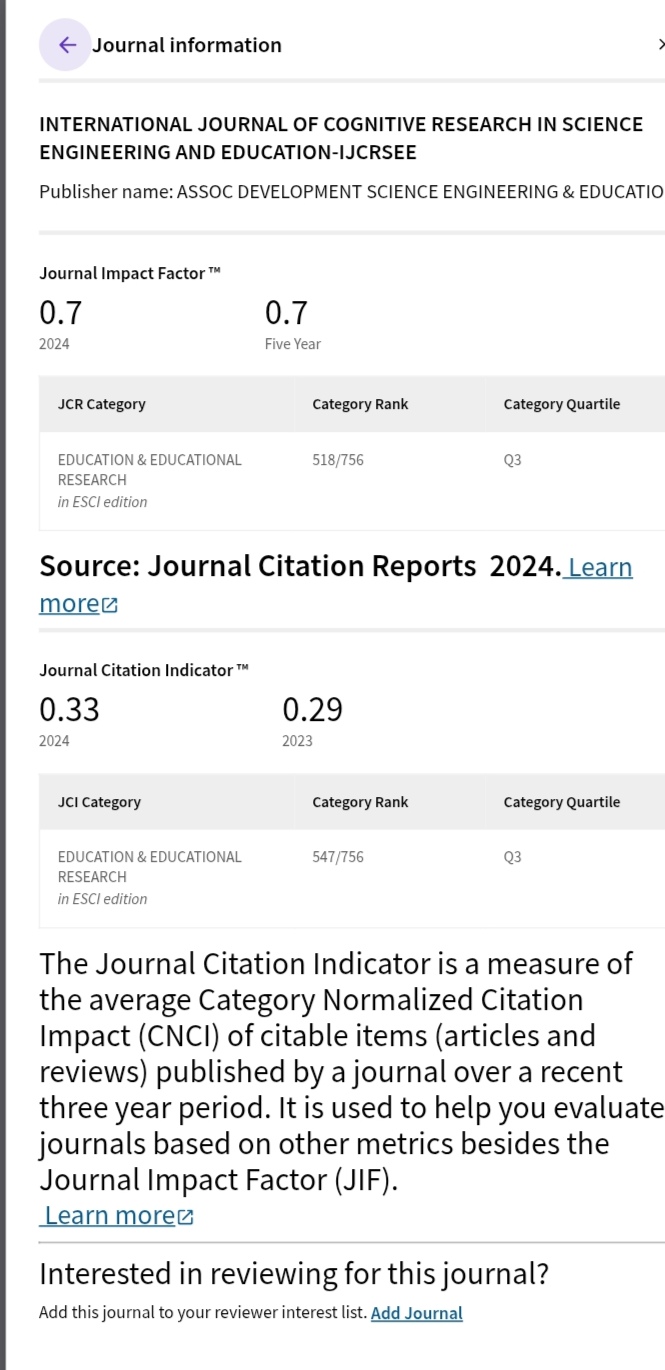Personal Predictors of Online Teaching - Experiences of The Teachers in Serbia in The Covid Regime
DOI:
https://doi.org/10.23947/2334-8496-2023-11-1-63-75Keywords:
online teaching, Covid-19, cognitive competence, affective competence, organizational and technical supportAbstract
The pandemic of the COVID-19 virus initiated a rapid organizational transformation of teaching at all levels of education and its implementation in a virtual environment. In this context, teachers’ perceptions of the predictors of online teaching largely determined the quality of its current implementation, but also the character of its further application in the future. Using the survey method, research was carried out with the aim of examining the attitudes of teachers in Serbia about personal predictors of online teaching and their determinants, in the past two school years. Personal predictors of online teaching are operationalized through the cognitive and affective competence of the teachers, as well as through organizational and technical support. Six hundred and seven teachers, who teach in the first three cycles of education, from all districts of the Republic of Serbia, participated in the research. Regarding all personal predictors considered, teachers evaluate cognitive competence as the most important predictor of the implementation of online teaching, then affective competence and finally, organizational and technical support. As the results of the research suggest, a significant influence of the dominant online experience, of the applied online platform, work experience and educational cycle on teachers’ perceptions of affective competence as a predictor of online teaching were determined, while the perceptions of organizational and technical support were significantly influenced by the place where the school was located and the applied online platforms. The obtained results may have implications for pedagogical practice and professional development of teachers in terms of consideration and awareness of the role of various personal predictors required for the successful use of modern educational technology.
Downloads
References
Baker, J.P., Goodboy, A.K., Bowman, N.D. & Wright, A.A. (2018). Does Teaching with PowerPoint Increase Students’ Learning? A Meta-analysis. Computers & Education, 126, 376–387. https://doi.org/10.1016/j.compedu.2018.08.003
Blömeke, S. (2017). Modelling Teachers’ Professional Competence as a Multi-dimensional Construct. In Guerriero S (Ed.), Pedagogical Knowledge and the Changing Nature of the Teaching Profession (pp. 119–135). Paris: OECD. https://www.oecd-ilibrary.org/education/pedagogical-knowledge-and-the-changing-nature-of-the-teaching-profession/modelling-teachers-professional-competence-as-a-multi-dimensional-construct_9789264270695-7-en
Bozkurt, A. et al. (2020). A global outlook to the interruption of education due to COVID-19 pandemic: Navigating in a time of uncertainty and crisis. Asian Journal of Distance Education, 15(10), 1-126. https://doi.org/10.5281/zenodo.3878572
Brofi, Dž. (2015). Kako motivisati učenike da uče [Motivating students to learn]. Beograd: Clio. Retrieved from https://clio.rs/proizvodi/didacta/kako-motivisati-ucenike-da-uce_11814
Cho, M.H., Cheon, J. & Lim, S. (2021). Preservice teachers’ motivation profiles, self-regulation, and affective outcomes in online learning. Distance Education, 42(1), 37-54. https://doi.org/10.1080/01587919.2020.1869528
Chiu, T.K.F. & Hew, T.K.F. (2018). Factors influencing peer learning and performance in MOOC asyn-chronous online discussion forum. Australasian Journal of Educational Technology, 34(4), 16–28. https://doi.org/10.14742/ajet.3240
Chiu, T.K., Lin, T.J. & Lonka, K. (2021). Motivating online learning: The challenges of COVID-19 and beyond. The asia-pacific education researcher, 30(3), 187-190. https://doi.org/10.1007/s40299-021-00566-w
Eickelmann, B., & Drossel, K. (2020). Schule Auf Distanz [School at a distance]. Berlin: Vodafone Stiftun]. Retrieved from https://www.vodafone-stiftung.de/wp-content/uploads/2020/05/Vodafone-Stiftung-Deutschland_Studie_Schule_auf_Distanz.pdf
Fraillon, J., Ainley, J., Schulz, W., Friedman, T. & Duckworth, D. (2019). Preparing for Life in a Digital World: The IEA International Computer and Information Literacy Study 2018 International Report. New York: Springer. Retrieved from https://library.oapen.org/handle/20.500.12657/39546
Guerriero, S. (2017). Pedagogical Knowledge and the Changing Nature of the Teaching Profession. Paris: OECD. Retrieved from https://www.oecd-ilibrary.org/education/pedagogical-knowledge-and-the-changing-nature-of-the-teaching-profession/teachers-pedagogical-knowledge-what-it-is-and-how-it-functions_9789264270695-6-en
Holden, J.T., Westfall, J.L.P. & Gamor, K.I. (2010). An Instructional Media Selection Guide for Distance Learning: Implications for Blended Learning. Washington: United States Distance Learning Association. Retrieved from https://participativelearning.org/pluginfile.php/539/mod_resource/content/6/Holden%2C%20Westfall%20-%202008%20-%20An%20Instructional%20Media%20Selection%20Guide%20for%20Distance%20Learning.pdf
Huber, S.G. & Helm, C. (2020). COVID-19 and Schooling: Evaluation, Assessment and Accountability in Times of Crises-reacting Quickly to Explore Key Issues for Policy, Practice and Research with the School Barometer. Educational Assessment, Evaluation and Accountability, 1–34. https://doi.org/10.1007/s11092-020-09322-y
Jäger-Biela, D., Kaspar, K. & König, J. (2020). Lerngelegenheiten Zum Erwerb Von Digitalisierungsbezogenen Medienkompetenzen. In Kaspar, K, Becker-Mrotzek, M, Hofhues, S, König, J & Schmeinck, D. (Eds.), Bildung, Schule, Digitalisierung Education, school, digitization. (pp. 66-72). Retrieved from https://www.waxmann.com/index.php?eID=download&buchnr=4246
Jin, X.Y., Deifell, E. & Angus, K. (2021). Emergency Remote Language Teaching and U.S.- Based College-Level World Language Educators’ Intention to Adopt Online Teaching in Postpandemic Times. The Modern language Journal, 105(2), 412-434. https://doi.org/10.1111/modl.12712
Johnson, S., Cooper, C., Cartwright, S., Donald, I., Taylor, P. & Millet, C. (2005). The experience of work-related stress across occupations. Journal of managerial psychology. 20, 178–187. https://doi.org/10.1108/02683940510579803
König, J., Jäger-Biela, D.J. & Glutsch, N. (2020). Adapting to online teaching during COVID-19 school closure: teacher education and teacher competence effects among early career teachers in Germany. European Journal of Teacher Education, 43(4), 608-622. https://doi.org/10.1080/02619768.2020.1809650
König, J., Wagner, C. & Valtin, R. (2011). Jugend - Schule - Zukunft. Psychosoziale Bedingungen Der Persönlichkeitsentwicklung - Ergebnisse Der Längsschnittstudie AIDA [Youth - School - Fu-ture. Psychosocial conditions of personality development. Results of the AIDA longitudinal study]. Münster: Waxmann. Retrieved from https://www.pedocs.de/frontdoor.php?source_opus=20900
Kumawat, K. (2020). Perceived stress and burnout in online teaching in teachers in India during pan-demic COVID-19. Indian Journal of Health & Wellbeing, 11(7), 486-492. Retrieved from https://web.s.ebscohost.com/abstract?direct=true&profile=ehost&scope=site&authtype=crawler&jrnl=22295356&AN=148893785&h=NI6gClEL2QMYJop0kB%2bj%2bEbUfX4ZkfTECeQpQttigqWy8%2fDvjeWX%2fYHB36W%2b9rhiV8wGuq1kqKt7mzrCqempUA%3d%3d&crl=c&resultNs=Admin-WebAuth&resultLocal=ErrCrlNotAuth&crlhashurl=login.aspx%3fdirect%3dtrue%26profile%3dehost%26scope%3dsite%26authtype%3dcrawler%26jrnl%3d22295356%26AN%3d148893785
Lauermann, F. & König, J. (2016). Teachers’ Professional Competence and Wellbeing: Understanding the Links between General Pedagogical Knowledge, Self-efficacy, and Burnout. Learning and Instruction, 45, 9–19. https://doi.org/10.1016/j.learninstruc.2016.06.006
MacIntyre P.D., Gregersen T. & Mercer S. (2020). Language teachers’ coping strategies during the Covid-19 conversion to online teaching: Correlations with stress, wellbeing and negative emotions. System, 94,102352. https://doi.org/10.1016/j.system.2020.102352
Mercer, S. & Gregersen, T. (2020). Teacher wellbeing. Oxford: University Press. Retrieved from https://www.google.rs/books/edition/Teacher_Wellbeing/13XYywEACAAJ?hl=en
Mishra, P. & Koehler, M.J. (2006). Technological Pedagogical Content Knowledge: A Framework for Teacher Knowledge. Teachers College Record, 108(6), 1017–1054. https://doi.org/10.1111/j.1467-9620.2006.00684.x
Nambiar, D. (2020). The impact of online learning during COVID-19: students’ and teachers’ perspective. The International Journal of Indian Psychology, 8, 783-793. https://doi.org/10.25215/0802.094
Nikolić, N. & Milojević, Z. (2020). Trenutno stanje u onlanjn nastavi u Srbiji i Regionu – Izveštaj. [Current situation in online teaching in Serbia and the Region - Report]. Beograd: Obrazovni kulturni centar. Retrieved from https://okc.rs/wp-content/uploads/2020/06/Istra%C5%BEivanje-Stanje-u-onlajn-nastavi-u-Srbiji.pdf.
Obrad, C. (2020). Constraints and consequences of online teaching. Sustainability, 12(17), 6982. https://doi.org/10.3390/su12176982
Pekrun, R., Lichtenfeld, S., Marsh, H.W., Murayama, K. & Goetz, T. (2017). Achievement Emotions and Academic Performance: Longitudinal Models of Reciprocal Effects. Child Development, 88(5), 1653–1670. https://doi.org/10.1111/cdev.12704
Prensky, M. (2001). Digital Natives, Digital Immigrants. On the Horizon, 9(5), 1–6. https://doi.org/10.1108/10748120110424816
Rachmadtullah, R., Aliyyah, R.R., Samsudin, A., Syaodih, E., Nurtanto, M. & Tambunan, A.R.S. (2020). The perceptions of primary school teachers of online learning during the COVID-19 pandemic period: A case study in Indonesia. Journal of Ethnic and Cultural Studies, 7(2), 90-109. https://www.jstor.org/stable/48710085
Ryan, R.M. & Deci, E.L. (2020). Intrinsic and extrinsic motivation from a self-determination theory perspective Definitions, theory, practices, and future directions. Contemporary Educational Psychology, 61,101860. https://doi.org/10.1016/j.cedpsych.2020.101860
Senko, C., Hulleman, C.S. & Harackiewicz, J.M. (2011). Achievement Goal Theory at the Crossroads: Old Controversies, Current Challenges, and New Directions. Educational Psychologist, 46(1), 26–47. https://doi.org/10.1080/00461520.2011.538646
Schleicher, A. (2020). Education disrupted—education built. Spotlight: Quality education for all during Covid-19 crisis. OECD/Hundred Research Report #011. Retrieved February 23, 2023. Retrieved from https://hundred-cdn.s3.amazonaws.com/uploads/report/file/15/hundred_spotlight_covid-19_digital.pdf
Shulman, L.S. (1987). Knowledge and Teaching. Foundations of the New Reform. Harvard Educational Review, 57(1), 1–22. https://doi.org/10.17763/haer.57.1.j463w79r56455411
Sprenger, D. A., & Schwaninger, A. (2021). Technology acceptance of four digital learning technologies (classroom response system, classroom chat, e-lectures, and mobile virtual reality) after three months’ usage. International Journal of Educational Technology in Higher Education, 18(1), 1–17. https://doi.org/10.1186/s41239-021-00243-4
Sutiah, S., Slamet, S., Shafqat, A. & Supriyono, S. (2020). Implementation of distance learning during the Covid-19 pandemic in faculty of education and teacher training. Cypriot Journal of Educational Sciences, 15(5), 1204–1214. https://doi.org/10.18844/cjes.v15i5.5151
Tan, P.J.B., & Hsu, M.H. (2017). Developing a system for English evaluation and teaching devices. In Proceedings of the 2017 International Conference on Applied System Innovation (ICASI), Sapporo, Japan, 13–17 May 2017; pp. 938–941. https://doi.org/10.1109/ICASI.2017.7988596
Terenko, O., & Ogienko, O. (2020). How to Teach Pedagogy Courses Online at University in COVID-19, Pandemic: Search for Answers. Romanian Journal for Multidimensional Education / Revista Romaneasca pentru Educatie Multidimensionala, 12(1), 173-179. https://doi.org/10.18662/rrem/12.1sup2/261
Toto, G.A., & Limone, P. (2021). Motivation, Stress and Impact of Online Teaching on Italian Teachers during COVID-19. Computers. 10(6), 75. https://doi.org/10.3390/computers10060075
Truzoli, R., Pirola, V. & Conte, S. (2021). The impact of risk and protective factors on online teaching experience in high school Italian teachers during the COVID-19 pandemic. Journal of computer assisted learning, 37(4), 940-952. https://doi.org/10.1111/jcal.12533
Tsai, C.C, Chai, C.S., Wong, B.K.S., Hong, H.Y. & Tan, S.C. (2013). Positioning design epistemology and its applications in education technology. Educational Technology & Society, 16(2), 81–90. Retrieved from https://www.jstor.org/stable/jeductechsoci.16.2.81
Villegas-Reimers, E. (2003). Teacher professional development: an international review of the literature. Paris: UNESCO International Institute for Educational Planning. Retrieved from http://file.snnu.net/res/20126/18/018526a6-3cbf-4c9d-ac0f-a0740094aa75.pdf
Wigfield, A. & Eccles, J.S. (2000). Expectancy–value theory of achievement motivation. Contemporary Educational Psychology, 25(1), 68–81. https://doi.org/10.1006/ceps.1999.1015
***GEW (Gewerkschaft Erziehung und Wissenschaft). (2020). Digitalpakt Schule Und Digitalisierung an Schulen [School digital pact and digitization in schools]. Frankfurt: GEW. Retrieved from https://www.gew.de/fileadmin/media/publikationen/hv/Bildung-digital/202004-Mitgliederbefr-Digitalisierung.pdf
***Evropska komisija (2018). Komunikacija Komisije Evropskom parlamentu, Veću, Evropskom gospodarskom i socijalnom odboru i Odboru regija o akcijskom planu za digitalno obrazovanje [Communication from the Commission to the European Parliament, the Council, the European Economic and Social Committee and the Committee of the Regions on the action plan for digital education]. Bruxelles: Evropska komisija. Retrieved from https://eur-lex.europa.eu/legal-content/HR/TXT/?uri=COM%3A2018%3A22%3AFIN
***Odluka o obustavi izvođenja nastave u visokoškolskim ustanovama, srednjim i osnovnim školama i redovnog rada ustanova predškolskog vaspitanja i obrazovanja [Decision on the Suspension of Teaching in Higher Education Institutions, Secondary and Primary Schools and the Regular Work of Pre-school Education Institutions] (2020). Službeni glasnik RS, br. 30/2020. Retrieved from https://www.paragraf.rs/glasila/rs/sluzbeni-glasnik-republike-srbije-30-2020.html
***Odluka o proglašenju vanrednog stanja [Decision on Proclamation of the State of Emergency] (2020). Službeni glasnik RS, br. 29/2020-3. Retrieved from https://www.pravno-informacioni-sistem.rs/SlGlasnikPortal/eli/rep/sgrs/predsednik/odluka/2020/29/1/reg
***OECD (2016). Innovating education and education for innovation. The power of digital technologies and skills, Paris: OECD Publishing. https://doi.org/10.1787/9789264265097-en
***Uredba o merama za vreme vanrednog stanja [Decree on Measures During the State of Emergency] (2020). Službeni glasnik RS, br. 31/2020. Retrieved from https://www.paragraf.rs/glasila/rs/sluzbeni-glasnik-republike-srbije-31-2020.html
Published
How to Cite
Issue
Section
Categories
License
Copyright (c) 2023 Marina Semiz, Danijela Vasilijević, Žana Bojović

This work is licensed under a Creative Commons Attribution 4.0 International License.
Plaudit
Accepted 2023-04-10
Published 2023-04-20











